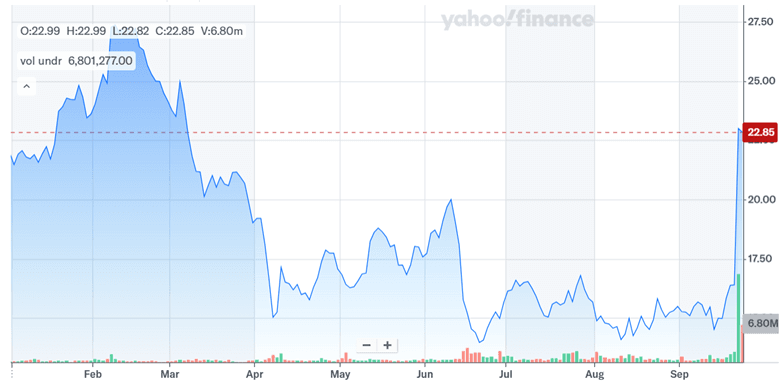PROS Gets Thoma Bravo’s Attention: What’s Behind The $1.4 Billion Takeover Buzz?

PROS Holdings (NYSE:PRO) may be heading toward a major shakeup. On September 22, 2025, the small-cap software company announced a definitive agreement to be acquired by private equity powerhouse Thoma Bravo for $1.4 billion in cash. Shareholders will receive $23.25 per share, reflecting a 41.7% premium to PROS’ pre-deal price and 53.2% over its 30-day VWAP. The transaction is expected to close in Q4 2025 and comes amid broader consolidation across the AI-powered SaaS landscape. For PROS, which specializes in CPQ (configure-price-quote) and revenue optimization software for B2B and travel industries, the deal represents validation of its niche strategy, improving fundamentals, and accelerating AI innovation roadmap. As the company refrains from hosting a Q3 earnings call due to the deal, focus now turns to the rationale behind Thoma Bravo’s interest and what synergies the acquisition could potentially unlock.
Strong B2B and Airline Customer Base with Deep Use-Case Penetration
PROS is likely attractive to Thoma Bravo because of its deeply embedded relationships across B2B enterprises and global airlines, and its defensible position in sectors such as manufacturing, logistics, and chemicals. The company delivers mission-critical pricing and selling tools like Smart CPQ and Smart POM, making it an integral part of its customers’ commercial operations. Recent customer wins in Q2 included Lennox, Louis Dreyfus, and RHI Magnesita, highlighting continued traction with large-scale enterprises seeking intelligent quote-to-cash workflows. The company also expanded with Holcim and Unidas, reinforcing its strength in rebate management and incentive optimization. On the travel side, PROS remains entrenched with leading carriers including American Airlines, Scoot (a Singapore Airlines subsidiary), and new customers like Air Greenland and ValueJet. Airlines are undergoing complex transformations as they reconfigure their tech stacks for offer and order management — a shift that plays directly into PROS’ offer optimization suite. With long-standing implementations and a unique understanding of yield management and revenue optimization, PROS becomes extremely sticky within client organizations. This level of use-case entrenchment provides high switching costs, predictable recurring revenue (86% of total in Q2), and cross-sell opportunities — all attributes that fit Thoma Bravo’s LBO thesis. Furthermore, PROS’ unique blend of AI agents, forecasting engines, and dynamic pricing tools positions it as a differentiated, domain-specific platform in the broader enterprise software landscape. For Thoma Bravo, the opportunity lies in expanding wallet share within existing accounts, accelerating upsell of underpenetrated modules, and leveraging platform maturity to extend into adjacent verticals.
Compelling AI Platform Trajectory Anchored By Domain-Specific Agents
PROS’ accelerating AI platform momentum could be a key driver of Thoma Bravo’s interest. The company has launched 12 AI agents that blend large language models (LLMs) with decades of proprietary numerical optimization. Unlike generic copilots, PROS agents function as virtual team members rather than simple conversational interfaces. They drive commercial strategy execution across pricing, quoting, rebate management, and revenue forecasting. In B2B, four agents are already in pilot deployment; in travel, adoption is ongoing with high-profile airline partners. PROS is prioritizing usage and adoption over near-term monetization but has indicated that future pricing may follow a usage- or outcomes-based model. These agents offer scalability, reduce service implementation time, and expand the value proposition for enterprise clients — reducing time to value and simplifying product onboarding. Thoma Bravo, which has historically capitalized on automation and data-driven platforms, could see PROS as a modular AI asset ready for further monetization via tighter GTM alignment, co-sell partnerships, and bundled pricing models. Moreover, the AI-driven simplification of deployment could reduce professional services dependency, boosting gross margins and freeing up internal resources for higher-margin SaaS expansion. The long-term synergy could involve integrating these agents into broader enterprise ecosystems or packaging them as standalone upsells within Thoma Bravo’s portfolio companies, especially those in e-commerce, infrastructure, and supply chain.
Margin Expansion & Operational Leverage Through Private Equity Discipline
PROS could benefit from Thoma Bravo’s strong track record of taking high-potential, subscale SaaS platforms private, optimizing their cost structures, and later reintroducing them through IPOs or strategic exits. PROS’ profile aligns with this strategy. While the company reported a 42% year-over-year improvement in adjusted EBITDA in Q2 2025 and raised its FY25 EBITDA guidance to $42–$44 million, its LTM EBITDA margins remain structurally low and negative on a GAAP basis. LTM valuation multiples as of September 2025 show Total Enterprise Value / EBITDA at -239x and EV/EBIT at -98x, reflecting historical operating inefficiencies and investments in growth. Even adjusted for guidance, forward TEV/EBITDA stands at a modest 24.84x — a manageable entry point for a PE firm with proven margin-enhancement playbooks. By driving organizational focus on high-return growth verticals, pruning low-margin services, simplifying go-to-market through strategic partnerships (e.g., Commerce/BigCommerce), and rationalizing internal operations, Thoma Bravo could enhance free cash flow yields and expand normalized earnings. With gross margins of 80% in subscription and 69% overall in Q2, the company’s unit economics provide a solid base to scale EBITDA. Moreover, PROS recently completed a debt restructuring — reducing its 2027 convertible note liability from $186.9 million to $79.9 million — granting further capital structure flexibility. Thoma Bravo’s centralized platform support, cross-portfolio synergies, and disciplined capital allocation could turn PROS’ modest cash flows into scalable FCF, making the asset more attractive for future monetization.
Strategic Fit With Thoma Bravo’s Broader Software Consolidation Strategy
This acquisition also aligns with Thoma Bravo’s broader strategic roadmap. The firm has been aggressively acquiring vertical SaaS companies, especially those at the intersection of AI, automation, and complex workflow optimization. Just weeks before announcing the PROS acquisition, Thoma Bravo signed a $12.3 billion deal to acquire Dayforce, another AI-integrated platform catering to HR and workforce management. PROS complements this with a focus on commercial excellence — enabling pricing, quoting, and revenue optimization across sales, marketing, and fulfillment. Together, these platforms create a stack of operational and commercial intelligence solutions. Thoma Bravo has the scale, portfolio synergies, and domain expertise to cross-sell capabilities, integrate backend infrastructure, and share go-to-market learnings across assets. For PROS, joining this ecosystem could accelerate roadmap execution, reduce product development redundancies, and open up new distribution channels. The partnership with Commerce (BigCommerce) is one such example where joint GTM could be scaled faster under a private equity-backed growth engine. Given Thoma Bravo’s history of retaining core management while embedding financial and operational rigor, PROS may continue to run autonomously but with deeper strategic oversight and enhanced investment capacity. As AI evolves from tactical tool to strategic layer across enterprise functions, Thoma Bravo could be assembling a portfolio of category leaders that deliver end-to-end AI-enabled enterprise productivity. PROS’ highly specialized commercial optimization layer fills an important gap in that thesis.
Final Thoughts

Source: Yahoo Finance
As we can see in the above chart, PROS’ stock spiked more than 40% after the announcement, underscoring investor optimism around the deal. The deal values the small-cap SaaS player at a forward EV/revenue multiple of 3.35x and EV/EBITDA of 24.84x — reasonable relative to historical software deal comps, especially given PROS' gross margin profile and improved FCF outlook (midpoint FY25 FCF guide: $42 million). We believe that from PROS’ perspective, the proposed acquisition by Thoma Bravo represents both validation of its long-term strategy and an opportunity to scale its platform more efficiently. However, while Thoma Bravo brings operational expertise and financial scale, the success of the deal will depend on its ability to accelerate ARR growth, streamline costs, and enhance monetization without disrupting customer relationships.




